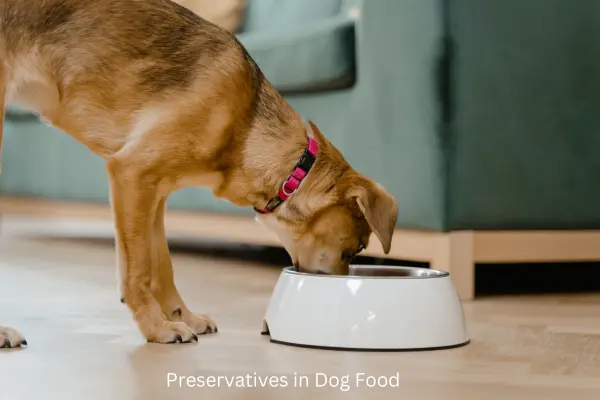Decoding the Health Impact of Preservatives in Dog Food
In pet nutrition, with countless options lining store shelves and packaging crafted to grab attention, knowing exactly what goes into meals for your furry companions is essential. Numerous commercial products include additives meant to preserve freshness, extend shelf life, or make flavors and textures more appealing. Yet, it’s important to question whether these substances are genuinely safe for regular consumption. Examining potential effects on overall wellness and understanding what animals are actually ingesting on a daily basis can provide valuable insight for making informed choices about their diet.
Types of Preservatives Used in Pet Food
| Preservative Type | Function |
| Antioxidants | Prevent oxidation of fats and oils, maintain freshness |
| Antimicrobials | Inhibit the growth of bacteria and other microorganisms |
| Acidifiers | Maintain optimal pH levels, preventing bacterial growth |
| Chelating Agents | Bind minerals, preventing oxidation and discoloration |
| Mold Inhibitors | Prevent mold growth in dry food |
When choosing meals for a furry companion, it’s important to examine ingredients closely, especially substances added to maintain freshness and prevent spoilage. Compounds like BHA, BHT, and ethoxyquin are commonly included to extend shelf life while inhibiting growth of mold or bacteria, ensuring food remains safe and palatable. Reading labels carefully and understanding these additives can help in making informed choices that prioritize quality and taste.
Why Are Preservatives Used?
These ingredients preserve freshness and prevent spoilage, maintaining flavor and texture. Each bite remains enjoyable, with quality and taste protected from deterioration. They act as a shield, keeping products consistent and safe for consumption over time.
Synthetic vs. Natural Preservatives
Some products rely on synthetic compounds like BHA and BHT, which are highly effective but raise concerns about long-term effects. Alternatively, natural options such as vitamin E and rosemary extract provide a gentler way to maintain freshness, though they may not last as long.
Before buying any product, carefully reviewing its label can guide you toward a choice that promotes your companion’s overall wellness. Labels often contain vital information about ingredients, usage instructions, and safety precautions, allowing you to make an informed decision. Paying close attention to these details ensures that every selection contributes positively to comfort, energy, and daily vitality. This extra step can prevent potential issues and guarantees that each item aligns with your companion’s unique needs.
Potential Effects on Canine Well-Being
Ingredients used each day influence far more than taste or freshness. Additives or preservatives chosen to improve texture or extend shelf life sometimes create unexpected effects, shaping energy, mood, or daily vitality. Learning what each component does and how it interacts internally makes thoughtful decisions possible, encouraging balance and steady functioning for them. Awareness like this allows routines to evolve with intention rather than habit.
Allergic Reactions to Additives
Just like people, our furry friends can sometimes react to specific components in what they consume daily. Certain substances mixed into their meals can set off sensitivities that show up in different ways—such as scratching more than usual, patches of irritated skin, or even upset stomachs. When something seems off—like changes in behavior, frequent discomfort, or unusual bathroom habits—it might be a sign that what’s being served isn’t sitting well with them. Keeping an eye on these changes can help figure out if their daily diet needs a closer look.
Digestive Concerns
Certain ingredients can upset stomach function, leading to signs such as vomiting, loose stools, or ongoing abdominal unease. Paying close attention after each serving and watching for changes in digestion or appetite offers valuable insight. Tracking reactions over time makes it easier to spot patterns, adjust choices, and keep comfort steady while preserving overall well-being.
Potential Long-Term Effects
With time, repeated exposure to certain commonly included substances has raised conversations about possible long-term effects. Some concerns focus on problems that may develop quietly, later interfering with daily comfort and overall well-being. Setting up regular check-ins with a trusted vet can make a meaningful difference. These visits allow early identification of subtle changes and provide practical guidance for adjusting daily choices, encouraging a longer life filled with energy and ease.
Natural Alternatives
More companies are shifting toward incorporating plant-based or lightly processed ingredients to keep food fresh while boosting nutritional quality for pets. Components like vitamin E and rosemary extract serve as natural preservatives, reducing spoilage while providing benefits such as antioxidant properties. Opting for these ingredients creates meals that are safer, more nourishing, and balanced, supporting vitality and overall wellness for furry companions.
Rise in Simple and Natural Diets
A growing number of caregivers now choose daily servings that fully avoid artificial additives. Instead of relying on long ingredient lists packed with unfamiliar chemicals, many lean toward simple recipes built from high-quality, easy-to-digest components. This change reflects a wider movement toward wholesome, natural nourishment, with choices free from synthetic elements or unnecessary extras that feel out of place in a dish.
Closer attention now goes into every ingredient, with focus placed on options that feel genuine, nourishing, and aligned with natural design. By offering flavors and nutrients in a cleaner, more satisfying form, caregivers aim to give them choices that feel pure, balanced, and enjoyable over time.
Homemade Options
For anyone willing to invest time and effort, preparing portions from scratch offers complete control over what goes into each serving. Selecting fresh, high-quality ingredients tailored to specific dietary needs can enhance nutritional value and encourage steady vitality. Guidance from a veterinarian remains essential to confirm proper balance, avoid gaps in nutrition, and preserve overall well-being over time.
No matter approach—choosing natural options, picking items with minimal ingredients, or preparing portions at home—attention should stay on nourishment that builds energy, resilience, and lasting well-being. Steering clear of synthetic additives and unnecessary chemicals keeps choices clean, balanced, and aligned with what works best for them.
Debated Additives
When deciding what goes into a bowl, it’s worth looking closely at what’s being served. Many store-bought options contain elements that have raised red flags over years. These ingredients, often added to extend shelf life or boost flavor, have been linked to serious concerns. Studies and real-life cases show connections between these common substances and long-term complications. Staying mindful and informed at mealtime matters—what goes in now can have lasting effects later.
Take ethoxyquin, for example. It has been connected to liver and blood complications, sparking discussions among experts and concerns from owners. Understanding which ingredients might cause problems helps in choosing better options for them.
Strict regulations make sure every item consumed meets established safety standards. Authorities set clear protocols that manufacturers must follow when adding extra ingredients or elements to any product. Such guidelines focus on protecting overall well-being while preserving enjoyment during each dining experience, allowing every occasion to remain secure and satisfying.
Caring for a furry companion means staying informed and proactive. Knowing which ingredients could pose risks and understanding regulations around pet products empowers smarter decision-making. Always examine product labels thoroughly and consult a veterinarian for guidance, ensuring your loyal friend enjoys safe, nutritious options. Over time, these mindful choices contribute to a life full of energy, happiness, and shared moments of joy.
Alternative Ways to Maintain Freshness
| Common Synthetic Preservatives | Natural Alternatives |
| BHA, BHT, Ethoxyquin | Vitamin E, Vitamin C, Rosemary extract, Green tea extract |
| Sodium propionate, Calcium propionate, Sorbic acid | Citric acid, Lactic acid, Vinegar, Essential oils (oregano, rosemary) |
| Citric acid, Phosphoric acid, Ascorbic acid | Naturally acidic fruits and vegetables (cranberries, blueberries, apples) |
| Silicon dioxide | Diatomaceous earth |
As more folks begin to take a closer look at what their four-legged friend is consuming each day, there’s been a noticeable shift toward cleaner, more wholesome choices. Instead of relying on artificial extras commonly found in store-bought products, people are exploring better options that align with a simpler, more nourishing approach. Let’s break down a few of these alternatives that are making waves among mindful caretakers:
Natural Alternatives:
A growing number of manufacturers are embracing components sourced from plants and other organic origins to keep products fresh and of high quality. Compounds such as vitamin E and rosemary extract serve as gentle protectors against spoilage, while also providing extra advantages like antioxidant properties and enhanced flavor. These selections promote a safer, more nourishing approach to what we feed our companions, focusing on wholesome elements that support overall well-being.
Rise in Simple and Clean Diets:
Growing numbers of guardians now choose formulas that skip synthetic chemicals along with unnecessary fillers. Such selections highlight premium, easily absorbed elements that encourage smooth digestion. Movement reflects strong interest in cleaner, simpler nutrition, placing value on wholesome, uncomplicated daily choices for them.
Homemade Options:
For anyone willing to invest extra effort, preparing portions from scratch offers complete control over ingredients. Selecting fresh, high-quality components matched to specific dietary needs ensures optimal nourishment. Consulting a vet remains crucial for maintaining proper balance.
No matter approach—using simpler recipes, limiting components, or preparing portions at home—primary aim should remain steady nourishment that encourages vitality and overall well-being. Keeping choices free from artificial chemicals and synthetic substances helps maintain balance and consistency for them over time.

Expert Opinions and Studies
Studies have explored how certain ingredients in pet meals can influence overall wellness, revealing several noteworthy concerns. For example, research points to potential allergic reactions linked to common chemical additives found in many commercial diets. This suggests that pets may occasionally encounter irritation, digestive upset, or other sensitivities stemming from components present in their daily food. Careful attention to ingredient quality and selection can play a crucial role in minimizing such issues and promoting a happier, more comfortable life for furry companions.
Veterinarians have also weighed in on the issue. Dr. Smith, an experienced vet, explains that some may experience gastrointestinal distress due to specific preservatives. It’s as if our four-legged friends are communicating through their upset tummies, even if we don’t fully understand what they’re trying to say.
Nutrition experts also have their say. Dr. Jones, a renowned specialist, warns that long-term exposure to certain ingredients can lead to complications. It’s a reminder to be mindful of what we’re offering our loyal companions.
It’s more than just intuition—studies and guidance from animal nutrition specialists show that what pets consume has a real impact on their well-being. Paying close attention to ingredient lists, understanding nutrient content, and discussing options with a veterinarian can make a significant difference in keeping a furry companion energized, happy, and thriving.
Maintaining peak condition begins with knowing exactly what goes into each serving. Paying attention to ingredients, portion size, and nutrient balance can make a noticeable difference. Below are practical tips to ensure every serving delivers optimal nourishment and lasting vitality:
Check Ingredient Lists
Paying close attention to information on packaging plays a crucial role in making safe choices. Ingredients such as BHA, BHT, and ethoxyquin often appear in products to prolong freshness, but awareness of these additives is important. Many individuals now prefer options with minimal synthetic chemicals. Selecting items that feature natural, plant-derived elements—like vitamin E or rosemary extract—can offer more confidence about product quality and safety.
Consult a Veterinarian
A vet is an excellent resource for tailored advice on their diet. They can recommend the most suitable options based on factors like age, breed, and any dietary restrictions.
Gradual Transition
Introducing a new option? Keep transition gentle to avoid upset stomach or discomfort. Start by mixing a small portion of new selection with current meals, then slowly increase amount over 7–10 days. This steady approach lets digestion adjust comfortably and lowers risk of sudden reactions.
Making informed choices about their nutrition can have a lasting impact on their overall well-being. A little extra attention goes a long way in keeping them happy and thriving!
Do certain ingredients affect digestion in Pets?
Certain added compounds, particularly synthetic ones such as BHA and BHT, can affect digestion. Many animals tolerate these compounds without issue, but some may experience bloating, loose stools, or mild stomach upset. Natural options, including vitamin E and rosemary extract, tend to be gentler on the digestive system. If your pet shows signs of sensitivity, choosing a formula with fewer additives or seeking guidance from a veterinarian may reduce discomfort and improve overall digestive comfort.
Can added ingredients impact long-term well-being?
Effects of synthetic compounds over time remain under investigation. Although many receive approval for consumption, studies indicate that frequent intake in high amounts over prolonged periods might strain organs or trigger cellular changes. Choosing natural alternatives, such as mixed tocopherols (a form of vitamin E), can offer a gentler method for maintaining freshness. Paying attention to ingredient lists and rotating sources can contribute to overall wellness and balance.
Are certain breeds or age groups more sensitive to added compounds?
Yes, younger, older, and certain breeds with predisposed sensitivities may react differently. Puppies and kittens have developing digestive systems that may struggle with synthetic additives, while seniors might have reduced kidney or liver function, making it harder to process some chemicals. Additionally, breeds prone to food sensitivities—like retrievers, bulldogs, and shepherds—may be more likely to experience adverse reactions. Choosing a formula suited for specific life stages and sensitivities can help maintain overall well-being.
Conclusion
Let’s wrap up our talk about additives in meals for our four-legged companions with a few key points. We’ve explored the common types, their potential effects on well-being, and some controversial aspects.
Think about how daily nourishment shapes them. Every ingredient included plays a part in energy, mood, and overall vitality. Certain additives work to keep items fresh, extend shelf stability, and protect flavor. While this preserves taste, those same substances may quietly influence activity, alertness, and daily liveliness. Paying attention to what goes into each serving can noticeably affect how energetic and vibrant they feel from day to day.
Making informed choices feels like offering a VIP pass to a brighter, happier life. Knowing what appears on ingredient lists allows smarter decisions that truly align with their needs. Convenience alone should never outweigh what works best for them.
As guardians, responsibility rests in every decision made. Prioritize well-being with each portion provided. Read labels closely, stay aware of specific additives, and explore alternatives that may feel gentler on internal systems.
They rely on us for everything—from playful moments to what fills a bowl each day. Every bite presents an opportunity to boost energy, maintain strength, and spark joy during daily adventures. Focus on thoughtful nourishment, active play, and outdoor fun that keep tails moving, paws racing, and spirits high. Here’s to lively days filled with joy, curiosity, and playfulness.
Check Ingredient Labels
Careful review of ingredient lists on packaging can create meaningful change. Watch for compounds such as BHA, BHT, or ethoxyquin, often included to maintain freshness and extend shelf stability. Many caregivers now lean toward options with fewer synthetic additives. Choices featuring plant-based elements, such as vitamin E or rosemary extract, offer a more natural approach and bring reassurance when deciding what to serve to them.
Consult Your Veterinarian
A reliable veterinarian serves as a valuable guide for personalized guidance. They assess individual factors such as age, breed, and dietary sensitivities to suggest options that best fit unique needs.
Gradual Meal Transition
Bringing in a new option calls for a slow, thoughtful transition to avoid stomach upset. Start by blending a small amount of something new with what feels familiar, then gently increase that portion over seven to ten days. This steady shift gives digestion time to adapt, easing strain and encouraging a smoother, more comfortable change.
A little extra attention goes a long way toward ensuring they thrive every day!
Resources:
FDA Pet Food Information: US Food and Drug Administration (FDA) website provides comprehensive information on safety rules and proper use of different additives in consumables. These instructions guarantee products comply with strict standards while remaining free from harmful chemicals. FDA actively monitors and assesses ingredients to protect pets along with their families. Individuals seeking up-to-date guidance on safety measures and regulatory updates can rely on FDA’s website as a trusted resource for accurate and current information.
National Center for Veterinary Medicine: National Center for Veterinary Medicine (NCVM), part of the USDA, offers resources on animal well-being and safety, covering ingredients and potential concerns in their diet.
BHA/BHT: American Veterinary Medical Association (AVMA) offers a brief overview of BHA/BHT in these products, stating they are safe at approved levels while also noting ongoing research into potential long-term effects.
Author Bio: Meet William Parker, a devoted pet enthusiast from your neighborhood and writer behind this guide on ingredients in pet food. With a passion for seeing furry companions thrive, William simplifies complex topics so owners can make informed choices. He focuses on selecting wholesome meals and maintaining a consistent routine, knowing every dish contributes to happiness and vitality. Follow William for tips and insights that put furry friends first, one thoughtful step at a time.




